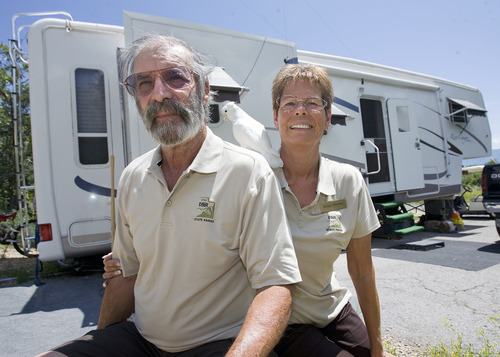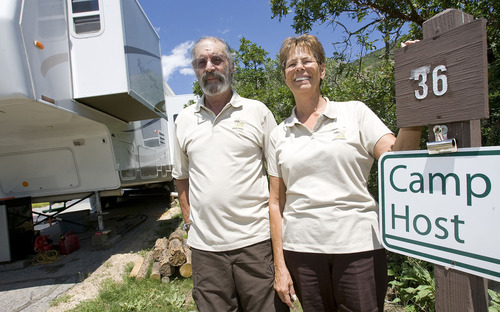This is an archived article that was published on sltrib.com in 2011, and information in the article may be outdated. It is provided only for personal research purposes and may not be reprinted.
They are often the first people visitors to Utah State Parks encounter and frequently the last people campers talk to, when the music in the next site is too loud at midnight.
Campground hosts play a vital role in the Utah State Parks system, with more than 100 parking their RV, pointing the satellite dish and charging their golf cart for a season of greeting the public each year.
Some stop by for a summer, some go back to the same place every summer and some move from park to park to gain an appreciation of each location.
"Their primary job is to be present in the campground at all times," said Utah State Parks deputy director Fred Hayes. "They are a friendly face for the visitor and there to help them get settled and provide important information about the park."
Campground hosts have been a part of Utah State Parks for more than 30 years, but their numbers and duties have increased over the decades.
"In the early days we were lucky to get someone who wanted to stay at the campground all summer and deal with the public," Hayes said. "We now have a generation that is used to living out of the motor home and serving as professional volunteers."
Take Billye and Mike Sylvester for example. The couple spend their winters and early springs serving as hosts at Snow Canyon State Park in southern Utah and are at Wasatch Mountain State Park in Midway this summer.
"We get to meet some wonderful people from all over the world. I'm also part gypsy — I hate staying in one place too long," said Billye Silvester, 63. "Being a camp host fits my lifestyle."
The Silvesters started working as campground hosts at Snow Canyon four years ago. Billye, who has a degenerative disc problem in her back, offers her time in the park office welcoming campers as they arrive and handling other such tasks. Mike, 66, patrols the campground raking campsites, cleaning fire pits and helping campers get settled.
The couple likes striking up conversations with the campers. Billye is particularly fond of chatting with the European visitors common at Snow Canyon State Park.
"Learning about the different cultures and seeing how their life is compared to the United States is really interesting," she said.
There is one downside, however, to serving as a campground host.
"My least favorite part is when you get that one in 100 ornery campers you get who are just plain rude," Billye Silvester said. "We are there to do them a service, and sometimes they don't like the steps we have to do to get them that service. We do our best, and it isn't any fun when they make it more difficult."
The Silvesters enjoy spending their free time at Utah State Parks as much as campers do. They plan to stay at Wasatch through August and then to head back to Snow Canyon. After two months there, they will hit the road for some exploring and return to their spot as campground hosts next spring.
And the pay for all their work? Electrical, water and sewer hookups for their recreational vehicles is the return for being at the beck and call of the public.
Hayes says couples like the Silvesters are an "unbelievable savings" to Utah State Parks.
Hosts no longer just collect fees and answer questions. There are daily patrols to make sure recently vacated campsites are clean for those arriving that day. Restrooms need to be cleaned, the sprinklers need to be moved and the entry gate needs to be staffed.
While hosts are there to help campers with minor issues with fellow recreationalists, major law enforcement issues are left to state park rangers. The host will take that complaint of a rowdy group with loud music, but, in most cases, will get a ranger to handle the issue.
In some cases a retired couple will arrive at the park with two duties. One, usually the woman, will serve as a campground host and the other, usually the husband, will work as an seasonal employee.
Each state park is not limited to just one campground host, and some of the largest parks will have a host for each loop.
Hayes said the state advertises for campground hosts in RV publications, but a lot of the spots are filled by returnees and word of mouth.
"Good campground hosts are like good employees — we want to keep them around," Hayes said.
The rewards of those good hosts are evident in the form of letters and emails sent to state parks.
"They typically say something like 'we met so-and-so at this park, and we love them. We are coming back because of them,' " Hayes said.





